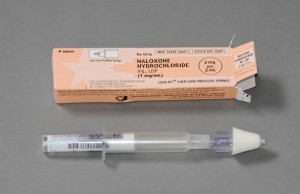Narcan saving lives in Kane, Kendall and DuPage counties
By Erika Wurst For Chronicle Media — February 22, 2016
Narcan, also known as naloxone, reverses the effects of a heroin overdose if given in time. Suburban first responders have been able to effectively use the medication to save lives. (Photo UC.org)
In the two years since DuPage County deputies and officers began administering the lifesaving drug Narcan to patients who overdose, 100 lives have been saved, county health officials recently announced.
The results are thanks to an effort that began in 2013 when the DuPage Narcan Program (DNP) was created to address the “alarming number of DuPage County deaths attributed to opiate overdoses,” according to the DuPage County Health Department.
Officers officially began administering Narcan while on duty in 2014. Through the program, more than 2,500 individuals — mostly police officers — have been trained to administer Narcan, also known as naloxone, which reverses the effects of a heroin overdose if given in time.
Since then, law enforcement departments in Kane, Kendall and DuPage counties have each been working with local health departments and agencies to get the drug in the hands of first responders.
“The deputies are out on patrol and sometimes respond quicker than (paramedics) just by being in the area. We felt equipping the deputies with some life-saving options for these overdose situations is good public safety practice,” Kendall County Sheriff Dwight Baird said in a statement shortly after the department’s Narcan training was completed in August 2015.
Within weeks of carrying the drug, they saved their first life. It has been their first and only save since they began using Narcan in the field.
DuPage County, however, has seen the most success in administering the drug since they began saving lives in 2014.
According to the DuPage County Health Department, administering Narcan saved 32 lives in 2014. There were 61 saves in 2015, and seven so far in 2016.
“Reaching 100 saves in just two years shows that the DNP is making progress against the heroin epidemic in DuPage County, and that is a credit to the officers on the street using Narcan and the partners supporting DNP,” said DuPage County Coroner Dr. Richard Jorgensen.
DuPage County Board Chairman Dan Cronin said saving lives was the board’s goal.
“We all agreed that even saving one life would make this program a success,” he said. “The benefits are priceless to the families of the loved ones who have been saved.”
In late August 2015, the Kendall County Sheriff’s Department became the first law enforcement agency in Kendall County to equip patrol deputies with Narcan.
Shortly after, on Oct. 12, 2015, Kendall deputies made their first save. Around 8:08 p.m. deputies responded to the first block of Hillside Road for reports of a man who was overdosed on drugs. When deputies arrived on scene, they found the man unresponsive and barely breathing, they said. Deputies administered a dose of Narcan, which helped stabilize the man until paramedics arrived. According to deputies, the man was alert and awake within two minutes of receiving the Narcan dose.
The Kane County Health Department began conducting Nacran administration training in July 2014.
Kane County Health Department spokesman Tom Schlueter said 18 lives have been saved since the drug was placed in officers’ hands.
To date, the Kane County Health Department has provided Narcan training to more than a 25 police departments, including Sugar Grove, North Aurora, St. Charles, and the Kane County Sheriff’s Department.
Kane County’s most recent save using the drug occurred on Feb. 6 in Batavia, Schlueter said.
Those working closely with addicts on the treatment end of the spectrum, including Kendall County Health Department Executive Director Amaal Tokars, have said Narcan is powerful tool to saving lives
“We absolutely see the value of preventing death from heroin overdose, and we absolutely want to see and support the idea of trained law enforcement officers being able to administer Narcan in an emergency,” Tokars said. “We appreciate the doors opening up for that and want to see law enforcement in a position where they administer Narcan readily.”
Tokars said it’s also important to be proactive instead of reactive to the opioid situation, which ranks as Kendall County’s fourth highest cause of drug treatment, behind alcohol and marijuana and cocaine.
“When we talk about using Narcan, it’s at point where someone has already gone far down the road (of addiction),” she said. Stopping the problem before it reaches that point is Tokars’ primary job as director of the health department.
“We want to bring attention to the breadth of addiction,” she said. “Resources have been cut at a time when addiction is really so prevalent.”
And while the efforts in DuPage County and the surrounding areas have been tangible, Karen Ayala, executive director of the DuPage County Health Department, said their work is far from finished.
“One hundred lives is a remarkable accomplishment, but DNP is not resting on its laurels,” she said. “This life-saving effort will continue, along with recovery assistance to those who have been saved so this cycle of drug abuse is broken.”
— Narcan saving lives in Kane, Kendall and DuPage counties —



